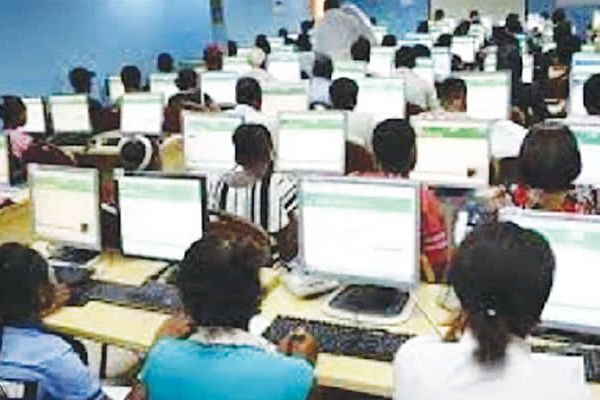Abuja, Nigeria — In what could be a transformative moment for Nigeria’s education sector, the Federal Government has announced sweeping reforms that will see the country’s flagship school-based exams — WAEC and NECO — fully transition to Computer-Based Testing (CBT) by 2026.
The revelation came on Tuesday as the Minister of Education, Dr. Tunji Alausa, monitored a pilot phase of the NECO Senior School Certificate Examination (SSCE) conducted via CBT at Sascon International School, Maitama, Abuja.
The atmosphere was part digital revolution, part quiet rebellion against outdated systems. As rows of senior secondary students calmly answered questions on screens, the Education Minister made one thing clear: Nigeria is done with paper-and-pen exams riddled with malpractice and inefficiency.
“This is the beginning of a new era,” Dr. Alausa declared. “Just like JAMB, NECO and WAEC will soon be conducted entirely in designated CBT centres across the nation. No more reliance on schools that lack adequate digital infrastructure.”
Bye-Bye Blackboard, Hello Broadband
According to the minister, both private and public-owned CBT centres — including those originally set up for JAMB — will now become hubs for administering SSCEs. The move, he explained, would not only curb rampant exam malpractice but also unlock a new digital economy powered by education.
“Owners of CBT centres have invested billions into infrastructure — computers, software, networks. We cannot keep them idle for 10 months of the year,” Alausa said. “This transition will also create jobs, expand our tech ecosystem, and unleash a whole new value chain.”
He commended NECO for what he described as a “seamless and successful pilot,” praising the agency’s leadership for its bold leap toward reform.
“When we first proposed CBT for SSCE, many said it couldn’t be done. But today, we’ve proved it’s not only possible — it’s inevitable,” he said.
A Nation in Transition
Alausa announced that by November 2025, all objective components of NECO and WAEC exams will be conducted via CBT. The full switch, including essay components, is expected by 2026.
“This is not about replacing one exam format with another. It’s about protecting the integrity of our exams, rebuilding public trust, and equipping our youth for a digital world,” the Minister asserted.
Standing beside him during the oversight tour were members of the Senate Committee on Basic and Secondary Education and other lawmakers, who pledged legislative backing for the reform.
“We are in the digital age. Our education system must reflect global realities,” said Senator Ekong Samson, Vice Chairman of the Committee.
NECO: Ready for the Digital Shift
Also speaking during the exercise, NECO Registrar, Prof. Ibrahim Dantani Wushishi, reaffirmed the Council’s readiness to embrace CBT despite infrastructure hurdles in some regions.
“We are fully prepared, both technically and professionally,” Wushishi said. “Yes, there are logistical challenges — especially in remote areas — but these are not deal-breakers. We will work with federal and state governments to scale up infrastructure.”
Wushishi added that the shift would drastically reduce exam fraud and improve the global credibility of NECO certificates. He noted that 1,367,210 candidates registered for this year’s SSCE, with Kano recording the highest enrollment at over 137,000, and Kebbi the lowest at just over 5,000.
One of the most remote NECO centres, he revealed, is in Jeddah, Saudi Arabia, where eight Nigerian students are sitting for their exams at the Nigerian International School.
“Our candidates are global, and our systems must be global too. CBT is the future, and NECO is ready to lead that change,” he said.
Legislative Oversight in Action
At another monitoring location — Federal Government Boys College, Apo — Chairman of the House of Representatives Committee on Basic Examination Bodies, Hon. Oboku Oforji, echoed the sentiment.
“This is NECO’s finest hour. We are proud of the leadership, the integrity of the exam process, and the direction we’re heading,” he said. “Our job as lawmakers is to ensure the framework for success — infrastructure, policy, and funding — is in place.”
A Digital Revolution in Education
For decades, the integrity of school exams in Nigeria has been marred by widespread malpractice — from leaked papers to impersonation. The shift to CBT, experts believe, will not only reduce cheating but also restore public faith in national assessments.
“We can’t allow our children to graduate in a system that rewards shortcuts,” Alausa warned. “This reform is not just about technology — it’s about integrity.”
With CBT at the centre of exam reform, the Federal Government appears poised to reshape the future of secondary education — merging technology, transparency, and trust in a country long plagued by systemic inefficiencies.









